| Listing 1 - 10 of 13 | << page >> |
Sort by
|
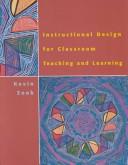
ISBN: 0395857023 9780395857021 Year: 2001 Publisher: Boston, Mass. Houghton Mifflin
Abstract | Keywords | Export | Availability | Bookmark
 Loading...
Loading...Choose an application
- Reference Manager
- EndNote
- RefWorks (Direct export to RefWorks)
Instructional systems --- Lesson planning --- Lesson plans --- Education --- Planning --- Teaching --- Instructional design --- Design, --- Curricula --- Didactic strategies
Book
ISBN: 9051891040 Year: 1992 Publisher: Utrecht Lemma
Abstract | Keywords | Export | Availability | Bookmark
 Loading...
Loading...Choose an application
- Reference Manager
- EndNote
- RefWorks (Direct export to RefWorks)
Instructional systems --- #PEDA *1.214.5 --- #PEDA *1.3 --- #PEDA *1.67 --- #PEDA *7.35 --- Instructional design --- Design --- Curriculum development
Book
ISBN: 0030081718 9780030081712 Year: 1974 Publisher: New York (N.Y.): Holt, Rinehart and Winston,
Abstract | Keywords | Export | Availability | Bookmark
 Loading...
Loading...Choose an application
- Reference Manager
- EndNote
- RefWorks (Direct export to RefWorks)
Teaching --- -Learning --- Design pédagogique --- Learning --- Instructional systems --- Design --- Learning. --- Design. --- Apprentissage --- Learning process --- Instructional design --- Comprehension --- Education --- Instructional systems - Design
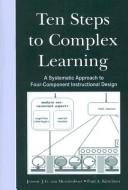
ISBN: 9780805857931 9780805857924 0805857923 0805857931 1410618056 9781410618054 Year: 2007 Publisher: Mahwah, N.J. Erlbaum
Abstract | Keywords | Export | Availability | Bookmark
 Loading...
Loading...Choose an application
- Reference Manager
- EndNote
- RefWorks (Direct export to RefWorks)
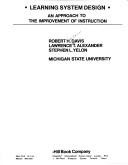
ISBN: 0070743347 9780070743342 Year: 1974 Publisher: New York (N.Y.): McGraw-Hill,
Abstract | Keywords | Export | Availability | Bookmark
 Loading...
Loading...Choose an application
- Reference Manager
- EndNote
- RefWorks (Direct export to RefWorks)
Teaching --- Instructional systems --- Learning --- Behaviorism (Psychology) --- Design --- -Learning --- Didactique Didactiek --- Etudes Studies --- Enseignement Onderwijs --- Motivation (formation) Motivatie (opleiding) --- Objectifs (formation) Doelstellingen (opleiding) --- Learning process --- Comprehension --- Education --- Learning systems --- Educational technology --- Behavioralism (Psychology) --- Behavioristic psychology --- Behaviouralism (Psychology) --- Behaviourism (Psychology) --- Scientific behaviorism --- Psychology --- Learning. --- Design. --- Behaviorism (Psychology). --- Instructional design --- Instructional systems - Design
Book
ISBN: 9781138080805 9781138080799 1138080799 1138080802 9781351624350 1351624350 9781315113210 131511321X 9781351624343 9781351624367 1351624369 1351624342 9780203096864 020309686X Year: 2018 Publisher: New York Routledge, Taylor & Francis
Abstract | Keywords | Export | Availability | Bookmark
 Loading...
Loading...Choose an application
- Reference Manager
- EndNote
- RefWorks (Direct export to RefWorks)
Ten Steps to Complex Learning presents a path from an educational problem to a solution in a way that students, practitioners, and researchers can understand and easily use. Students in the field of instructional design can use this book to broaden their knowledge of the design of training programs for complex learning. Practitioners can use this book as a reference guide to support their design of courses, curricula, or environments for complex learning.Now fully revised to incorporate the most current research in the field, this third edition of Ten Steps to Complex Learning includes many references to recent research as well as two new chapters. One new chapter deals with the training of 21st-century skills in educational programs based on the Ten Steps. The other deals with the design of assessment programs that are fully aligned with the Ten Steps. In the closing chapter, new directions for the further development of the Ten Steps are discussed.https://www.routledge.com/Ten-Steps-to-Complex-Learning-A-Systematic-Approach-to-Four-Component/van-Merrienboer-Kirschner/p/book/9781138080805
leren leren --- educatief ontwerpen --- probleemoplossend denken --- probleemgestuurd leren --- actief leren --- Didactic strategies --- Instructional systems --- didactiek --- Instructional design --- Design --- Leertheorieën --- Leerstijlen --- Cognitieve ontwikkeling --- Onderwijs --- Probleemoplossend denken --- 21th century skills --- Training --- Didactische principes --- Didactiek --- Leren leren --- Leerstrategieën --- Leerpsychologie --- Hoger onderwijs --- Onderwijsstijlen --- Competentiegericht onderwijs --- Onderwijsvernieuwing --- 371.3 --- Leertheorie --- Leerstijl --- 21st century skills --- Didactisch principe --- Leerstrategie --- Onderwijsstijl --- Opvoeding --- Pedagogiek --- Statistische gegevens --- Sport --- Instructional systems - Design --- Training (sport)
Book
ISBN: 9715612644 9789715612647 Year: 1999 Publisher: Manila
Abstract | Keywords | Export | Availability | Bookmark
 Loading...
Loading...Choose an application
- Reference Manager
- EndNote
- RefWorks (Direct export to RefWorks)
Open learning --- Distance education --- Teaching --- Instructional systems --- 810 Theorie en Methode --- Distance learning --- Education --- Telecommunication in education --- Flexible learning --- Flexistudy --- Self-supported study --- Learning --- Adult education --- Independent study --- Self-culture --- Instructional design --- Curriculum materials --- Educational media --- Instructional materials --- Teaching materials --- Educational technology --- Media programs (Education) --- Aids and devices --- Design --- Didactic strategies --- Adult education. Lifelong learning --- Asian Development Bank

ISBN: 1280189916 9786610189915 0387234810 0387234764 1441936327 9781280189913 9780387234816 Year: 2005 Publisher: New York, NY : Springer US : Imprint: Springer,
Abstract | Keywords | Export | Availability | Bookmark
 Loading...
Loading...Choose an application
- Reference Manager
- EndNote
- RefWorks (Direct export to RefWorks)
The purpose of this volume is to help educators and training developers to improve the quality of their instruction. Unlike other books, which have appeared so far, this volume is not limited to a particular theoretical position. Nor is it like many of the instructional design texts, which ignore the learning literature. Rather, it draws upon any and all of those research-based principles regardless of learning theory, which suggest heuristics to guide instructional strategies. The approach of the authors is unique in that they develop a framework or model taxonomy for tasks, through which the principles of learning can be related to particular learning processes, suggesting distinctive strategies for specific instructional tasks. The authors present a four-stage model that includes Acquisition, Automaticity, Near Term Transfer, and Far Term Transfer. The book is a practical guide for developing instructional strategies across the four principal domains, cognitive, affective, psychomotor, and interpersonal; and is backed by empirically supported learning principles. It is useful both to the experienced as well as the novice developer (e.g. the student). "The current volume strikes a nice balance between theory and practice and provides a straightforward model of instruction that is easily connected with relevant research but equally easy to apply to instructional development projects… The detailed treatment of the interpersonal domain and the emphasis on technology integration clearly distinguish the book as a modern treatment of instructional development that goes well beyond traditional instructional system development models… Therefore, this volume should provide a well-grounded and useful tool for instructional developers." From the Preface by Michael Spector, Florida State University. "This book represents a major milestone in the literature on learning because it brings togetherresearch from the fields of psychology, education, and the training in a format which is highly useful to practitioners. It will be very valuable to teachers, trainers, students, and researchers alike." Greg Kearsley, University of Wisconsin, Madison and, UMUC, University of Maryland.
Instructional systems --- Learning, Psychology of. --- Design. --- Learning --- Psychology of learning --- Educational psychology --- Comprehension --- Learning ability --- Instructional design --- Psychological aspects --- Didactics --- Learning, Psychology of --- #PBIB:2005.2 --- Design --- Learning & Instruction. --- Education, general. --- Teaching and Teacher Education. --- Learning. --- Instruction. --- Education. --- Teaching. --- Instruction --- Pedagogy --- School teaching --- Schoolteaching --- Education --- Pedagogical content knowledge --- Training --- Children --- Education, Primitive --- Education of children --- Human resource development --- Schooling --- Students --- Youth --- Civilization --- Learning and scholarship --- Mental discipline --- Schools --- Teaching --- Learning process --- Teachers --- Instructional Psychology. --- Training of.
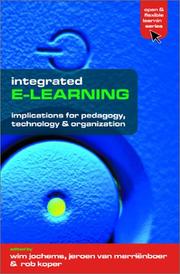
ISBN: 0749440147 0415335035 0415335027 0749440155 Year: 2004 Publisher: London RoutledgeFalmer
Abstract | Keywords | Export | Availability | Bookmark
 Loading...
Loading...Choose an application
- Reference Manager
- EndNote
- RefWorks (Direct export to RefWorks)
Internet in higher education --- Employees --- -Instructional systems --- -Education, Higher --- -#PBIB:2005.1 --- College students --- Higher education --- Learning systems --- Laborers --- Personnel --- Workers --- Training of --- -Computer-assisted instruction --- Design --- Effect of technological innovations on --- Education --- Internet in higher education. --- Teleleren. --- Social Sciences and Humanities. Education --- Educational Methods --- Computer Assisted Instruction --- E-learning --- Computer Assisted Instruction. --- Education, Higher --- Instructional systems --- 451.3 --- Leeromgevingen --- Onderwijsvernieuwing --- Instructional design --- Persons --- Industrial relations --- Personnel management --- Technological innovations --- Training of&delete& --- Computer-assisted instruction --- #PBIB:2005.1 --- Computer assisted instruction --- Effect of technological innovations on. --- Computer-assisted instruction. --- Design.
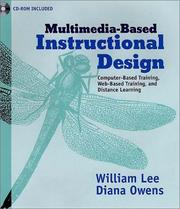
ISBN: 0787951595 Year: 2000 Publisher: San Francisco : Jossey-Bass,
Abstract | Keywords | Export | Availability | Bookmark
 Loading...
Loading...Choose an application
- Reference Manager
- EndNote
- RefWorks (Direct export to RefWorks)
Computer-assisted instruction --- Employees --- Instructional systems --- #PBIB:2002.4 --- Instructional design --- Laborers --- Personnel --- Workers --- Persons --- Industrial relations --- Personnel management --- CAI (Computer-assisted instruction) --- Computer-aided instruction --- Computer-assisted learning --- Computer based instruction --- Computer-enhanced learning --- Electronic data processing in programmed instruction --- ILSs (Integrated learning systems) --- Integrated learning systems --- Microcomputer-aided instruction --- Microcomputer-assisted instruction --- Microcomputer-assisted learning --- Microcomputer-based instruction --- Teaching --- Education --- Educational technology --- Programmed instruction --- Telematics --- Training of&delete& --- Planning --- Design --- Data processing --- Computer assisted instruction --- internet --- onderwijs --- computerondersteund onderwijs --- Afstandsonderwijs. --- Internet. --- Multimedia. --- Onderwijstechnologie. --- Training of
| Listing 1 - 10 of 13 | << page >> |
Sort by
|

 Search
Search Feedback
Feedback About UniCat
About UniCat  Help
Help News
News